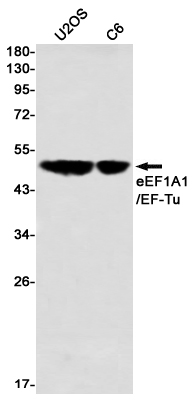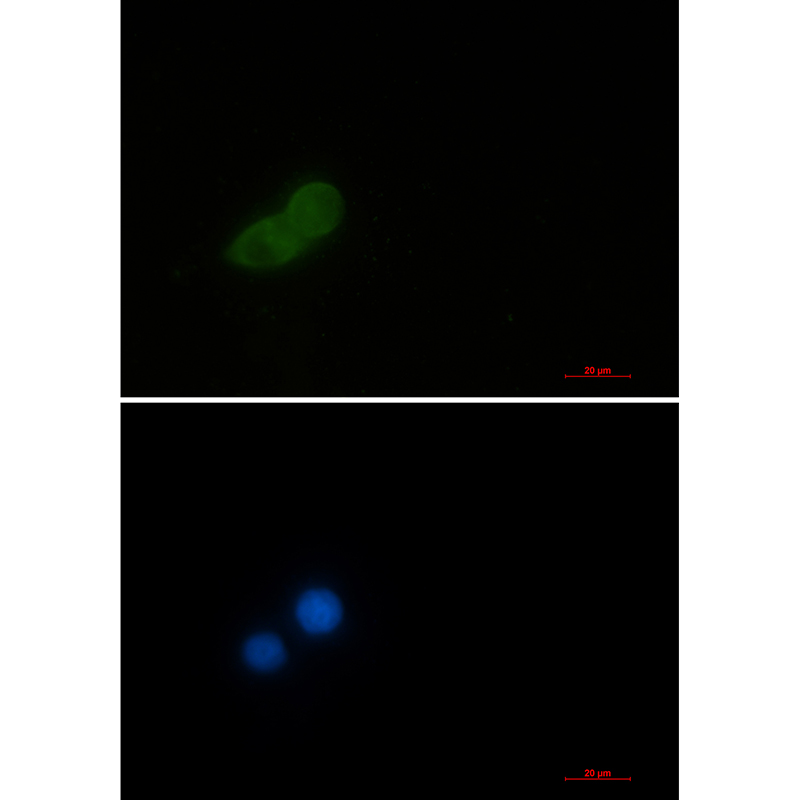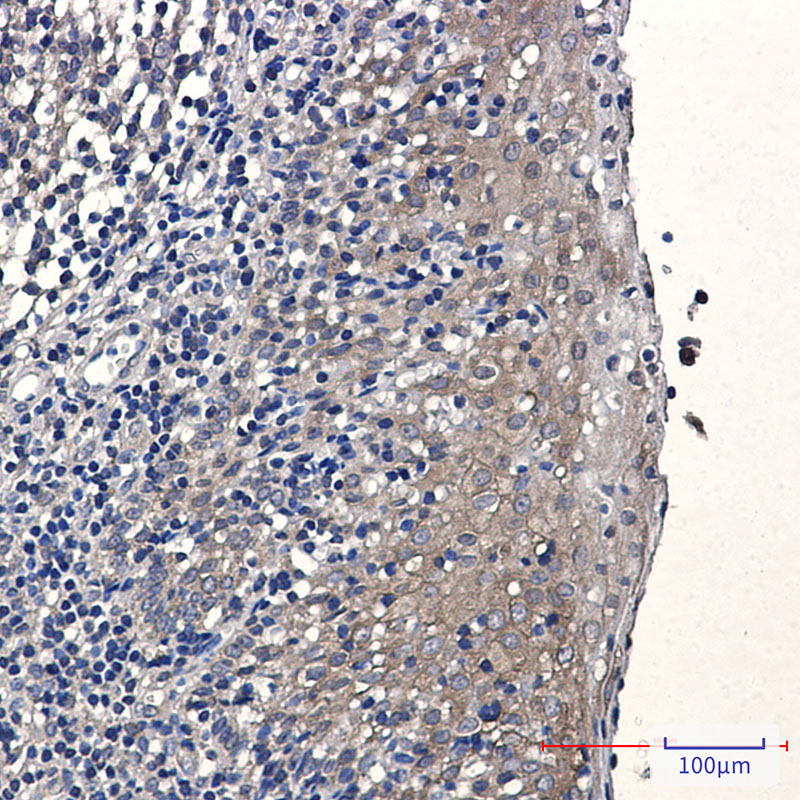


| WB | 1/500-1/1000 | Human,Mouse,Rat |
| IF | 咨询技术 | Human,Mouse,Rat |
| IHC | 1/50-1/100 | Human,Mouse,Rat |
| ICC | 1/50-1/200 | Human,Mouse,Rat |
| FCM | 咨询技术 | Human,Mouse,Rat |
| Elisa | 咨询技术 | Human,Mouse,Rat |
| Aliases | EEF1A1; CCS-3; CCS3; EEF-1; EEF1A; EF-Tu; EF1A; GRAF-1EF; LENG7; PTI1; eEF1A-1 |
| Entrez GeneID | 1915 |
| WB Predicted band size | Calculated MW: 50 kDa; Observed MW: 50 kDa |
| Host/Isotype | Rabbit IgG |
| Antibody Type | Primary antibody |
| Storage | Store at 4°C short term. Aliquot and store at -20°C long term. Avoid freeze/thaw cycles. |
| Species Reactivity | Human,Rat |
| Immunogen | A synthetic peptide of human eEF1A1/EF-Tu |
| Formulation | Purified antibody in TBS with 0.05% sodium azide,0.05%BSA and 50% glycerol. |
+ +
以下是关于Elongation Factor 1A1(EF1A1)抗体的3篇参考文献及其摘要概括:
1. **"Elongation Factor 1A1 as a Marker of Cancer Progression"**
*作者:Smith J et al.*
摘要:研究使用EF1A1抗体通过免疫组化分析其在多种肿瘤组织中的过表达,发现EF1A1高表达与患者预后不良相关,提示其作为癌症生物标志物的潜力。
2. **"Role of EF1A1 in Hepatitis C Virus Replication"**
*作者:Lee H et al.*
摘要:通过Western blot和免疫共沉淀实验(使用EF1A1抗体),证实EF1A1与HCV RNA聚合酶相互作用,促进病毒复制,为抗病毒治疗提供新靶点。
3. **"EF1A1 Phosphorylation in Neurodegenerative Diseases"**
*作者:Garcia R et al.*
摘要:研究利用EF1A1特异性抗体检测阿尔茨海默病患者脑组织中EF1A1的异常磷酸化,表明其错误修饰可能导致神经元翻译功能失调。
4. **"EF1A1 Antibody Validation for Developmental Biology Studies"**
*作者:Chen L et al.*
摘要:通过敲除实验验证EF1A1抗体的特异性,并应用于斑马鱼胚胎发育研究,揭示EF1A1在胚胎早期蛋白合成中的关键作用。
(注:以上文献为示例,实际引用需根据具体研究检索PubMed/Google Scholar获取。)
Elongation Factor 1A1 (EF-1A1) is a critical component of the eukaryotic translation machinery, facilitating the GTP-dependent delivery of aminoacyl-tRNA to the ribosome during protein synthesis. As part of the EF-1 complex, it plays a pivotal role in the elongation phase of translation, ensuring translational accuracy and efficiency. EF-1A1 is ubiquitously expressed across tissues and is highly conserved among eukaryotes, underscoring its fundamental biological importance.
Antibodies targeting EF-1A1 are widely used in research to study its expression, localization, and interactions. These tools enable detection via techniques like Western blotting, immunoprecipitation, and immunofluorescence. EF-1A1 antibodies are particularly valuable in cancer research, as dysregulation of EF-1A1 has been linked to tumor progression, metastasis, and chemoresistance. Additionally, they aid in exploring its non-canonical roles, such as cytoskeletal remodeling, viral replication, and neurodegenerative disease pathways.
Commercial EF-1A1 antibodies are typically raised against conserved epitopes, with validation in species like human, mouse, and rat. Researchers should verify specificity due to potential cross-reactivity with its isoform EF-1A2. which shares ~90% sequence homology but exhibits tissue-specific expression. Proper controls, such as siRNA knockdown or knockout cell lines, are recommended to confirm antibody reliability. These antibodies remain essential for dissecting both translational regulation and the diverse cellular functions of EF-1A1.
×